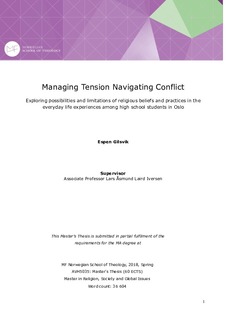Managing Tension Navigating Conflict : Exploring possibilities and limitations of religious beliefs and practices in the everyday life experiences among high school students in Oslo
Master thesis
Permanent lenke
http://hdl.handle.net/11250/2566048Utgivelsesdato
2018Metadata
Vis full innførselSamlinger
Sammendrag
This thesis explores the topic of religious limitations and possibilities in the context of high school students in Oslo. Its main hypothesis is that religious youth hide and control faith information as actors in their everyday-life in the school.
The research question asks how and why students in this area of society express or repress their religious beliefs. This paper aims to answer this and further explore common markers of religiosity in addition to examining the effects of students concealing their faith.
It is a democratic problem if particular groups in society self-censors to avoid stigma or criticism and therefor in the best interest of our common ‘disagreement community’ that all views, also in terms of religious diversity, are given a seat at the table.
The qualitative empirical data is gathered through twelve semi-structured interviews with Muslims, Christians and Non-believers from five different high schools in greater Oslo. The methodological approach emphasise both the phenomena of how each respondent experiences and observes religion and the discursive perspectives on what and how they talk about religion.
The main findings, is synthesised in the larger hypothesis of religion being viewed through a lens of conflict. This relates to ideas of the dominant secular discourse and Christians being subject to what is coined harsher self-criticism. The direct effects of the ‘conflict narrative’ are religious privatisation and believers hiding their belief to avoid stigma. While non-whiteness functions as an immediate religious identifier and hence discredits the actor, whiteness it is argued, conceals religious identity and leaves the religious white only potentially discredited. This paper generally supports the theories in Faith information Control, however critiques parts of it and offers an alternative hypothesis suggesting that white silence does not merely hide faith but signifies a secular non-religious position.
